- Home
- Quizzes
- My Quiz Activity
- Newsletters
- Sports Betting
- MY FAVORITES
- Add Sports/Teams
- SPORTS
-
NFL
- NFL Home
- Arizona Cardinals
- Atlanta Falcons
- Baltimore Ravens
- Buffalo Bills
- Carolina Panthers
- Chicago Bears
- Cincinnati Bengals
- Cleveland Browns
- Dallas Cowboys
- Denver Broncos
- Detroit Lions
- Green Bay Packers
- Houston Texans
- Indianapolis Colts
- Jacksonville Jaguars
- Kansas City Chiefs
- Las Vegas Raiders
- Los Angeles Chargers
- Los Angeles Rams
- Miami Dolphins
- Minnesota Vikings
- New England Patriots
- New Orleans Saints
- New York Jets
- New York Giants
- Philadelphia Eagles
- Pittsburgh Steelers
- San Francisco 49ers
- Seattle Seahawks
- Tampa Bay Buccaneers
- Tennessee Titans
- Washington Commanders
-
MLB
- MLB Home
- Arizona Diamondbacks
- Atlanta Braves
- Baltimore Orioles
- Boston Red Sox
- Chicago White Sox
- Chicago Cubs
- Cincinnati Reds
- Cleveland Guardians
- Colorado Rockies
- Detroit Tigers
- Houston Astros
- Kansas City Royals
- Los Angeles Angels
- Los Angeles Dodgers
- Miami Marlins
- Milwaukee Brewers
- Minnesota Twins
- New York Yankees
- New York Mets
- Oakland Athletics
- Philadelphia Phillies
- Pittsburgh Pirates
- San Diego Padres
- San Francisco Giants
- Seattle Mariners
- St. Louis Cardinals
- Tampa Bay Rays
- Texas Rangers
- Toronto Blue Jays
- Washington Nationals
-
NBA
- NBA Home
- Atlanta Hawks
- Boston Celtics
- Brooklyn Nets
- Charlotte Hornets
- Chicago Bulls
- Cleveland Cavaliers
- Dallas Mavericks
- Denver Nuggets
- Detroit Pistons
- Golden State Warriors
- Houston Rockets
- Indiana Pacers
- Los Angeles Clippers
- Los Angeles Lakers
- Memphis Grizzlies
- Miami Heat
- Milwaukee Bucks
- Minnesota Timberwolves
- New Orleans Pelicans
- New York Knicks
- Oklahoma City Thunder
- Orlando Magic
- Philadelphia 76ers
- Phoenix Suns
- Portland Trail Blazers
- Sacramento Kings
- San Antonio Spurs
- Toronto Raptors
- Utah Jazz
- Washington Wizards
-
NHL
- NHL Home
- Anaheim Ducks
- Arizona Coyotes
- Boston Bruins
- Buffalo Sabres
- Calgary Flames
- Carolina Hurricanes
- Chicago Blackhawks
- Colorado Avalanche
- Columbus Blue Jackets
- Dallas Stars
- Detroit Red Wings
- Edmonton Oilers
- Florida Panthers
- Los Angeles Kings
- Minnesota Wild
- Montreal Canadiens
- Nashville Predators
- New Jersey Devils
- New York Islanders
- New York Rangers
- Ottawa Senators
- Philadelphia Flyers
- Pittsburgh Penguins
- San Jose Sharks
- Seattle Kraken
- St. Louis Blues
- Tampa Bay Lightning
- Toronto Maple Leafs
- Vancouver Canucks
- Vegas Golden Knights
- Washington Capitals
- Winnipeg Jets
- NCAAF
- NCAAM
- Boxing
- Entertainment
- Lifestyle
- Golf
- MMA
- Soccer
- Tennis
- Wrestling
- More Sports
- RESOURCES
- My Account
- YB on Facebook
- YB on Twitter
- YB on Flipboard
- Contact Us
- Privacy Policy
- Terms of Service
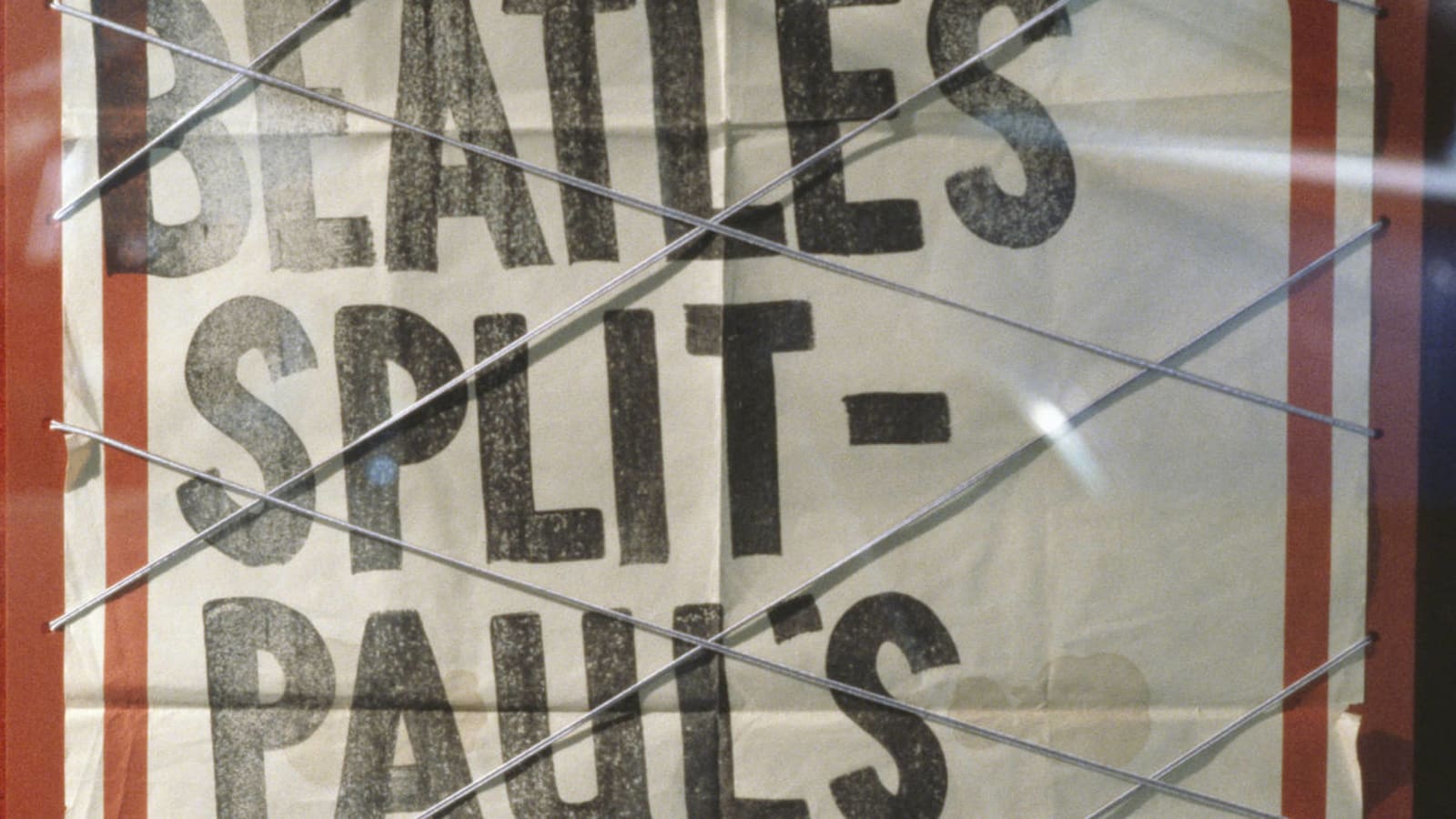
Musicians who famously quit their bands
"Paul Quits the Beatles!" the headline of The Daily Mirror read in its April 10, 1970, edition, in a font size that took over nearly half of the page. In truth, there has rarely been a band as lionized and beloved as The Beatles, both during their run and in the decades that followed. But after notable tensions in the group, it was McCartney who left, dropping his first solo album less than a month before the Beatles' final effort, "Let It Be," was released. A narrative started about how John Lennon's wife Yoko Ono was the impetus for the band's dissolution, but it was McCartney's decision to leave first and foremost.
Of course, people have left bands for a variety of reasons, whether it be creative differences, wanting to branch out on their own or because their personal lives got in the way of the music. No matter the reason, here is our list of shocking departures that changed the course of pop music itself. (Note: We did our best to distinguish quitting from being fired from a band, as that's a list for another day.)
Peter Hook (New Order)
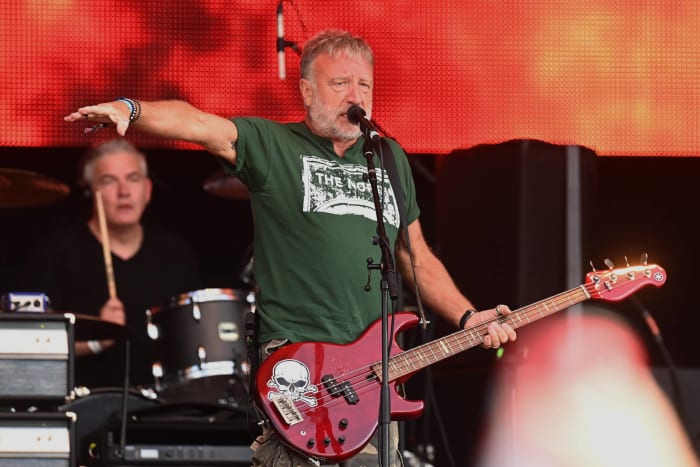
Bernard Sumner, Stephen Morris, and Peter Hook are a group of guys bonded by both music and tragedy. Their first band, the legendary Joy Division, immediately ceased operations following the tragic passing of lead singer Ian Curtis, leading the trio to create the dancier, synthier, and eventually more popular group New Order in 1980. They had oodles of hits over the decades, broke up once before in 1993, and successfully reunited. Yet, in 2007, bassist Hook said he was done making music with Sumner. The group went on touring and recording without him, but with Hook alleging that his stake in royalties had been dramatically reduced, lawsuits were filed, and the internal conflict soon became public press fodder. While both Hook and his ex-cohorts have managed to continue their careers independent of each other, there is no sign of the guys reuniting anytime soon. "If [it] wasn't for the wife, I'd probably be in prison now," said Hook on the beef in 2020. Yikes.
Simon Gallup (The Cure)
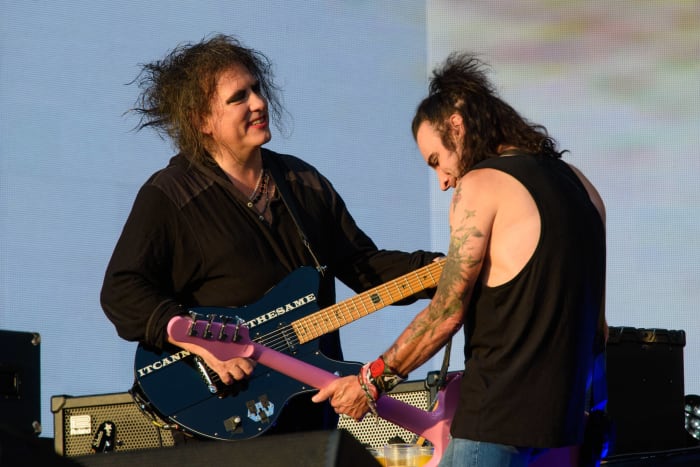
The Cure, in effect, is and always has been Robert Smith. The eclectic singer-songwriter is a force all his own, and throughout The Cure's existence, he has remained its only constant, with multiple musicians rotating in and out of the lineup over the decades. Yet bassist Simon Gallup has been Smith's rock, serving as the group's second-longest serving member, having joined up in 1979. In 2019, Smith even did an interview saying that "the heart of the live band has always been Simon," and that "it's weird that over the years and the decades, he's often been overlooked. He doesn't do interviews, he isn't really out there, and he doesn't play the role of a foil to me in public, and yet he's absolutely vital to what we do." Sadly, in the summer of 2021, Gallup wrote a Facebook post indicating he was no longer in the outfit and that he "just got fed up of betrayal." It was a shock to many fans who had never doubted the duo's commitment to the cause, but this shock soon turned into confusion, as a few months later, that original post was deleted, and Gallup wrote a follow-up that indicated that he was actually still in the group. With a long-delayed new Cure album in the works and basically no immediate rebuttal from the reclusive Smith, we'll just have to take Gallup at his word at this point.
Will Butler (Arcade Fire)

While the stadium-filling art-rock of Arcade Fire has been something of a constant for the past two decades, the swirling center of the storm has remained the husband-and-wife duo of Win Butler and Régine Chassagne. Yet while they get pegged as the band's de facto leaders, there is a litany of talented multi-instrumentalists in the Fire's fold, key among them being Win's brother, Will. Will has certainly racked up the most extracurriculars of the group's members, netting an Academy Award nomination for his work on the score to the 2013 Spike Jonze movie "Her" and then dropping no less than three different solo albums over the years. Thus, when Arcade Fire started ramping up the promotional cycle for their 2022 full-length "WE", Will's absence from music videos was notable, and Will took to Twitter to clarify that "There was no acute reason beyond that I've changed—and the band has changed—over the last almost 20 years. Time for new things." This includes work for music on a new play, and while he insists that the band is still "his friends and family" and there's no bad blood, Will Butler will still be around for a good while to come.
Winston Marshall (Mumford & Sons)

In May 2018, the infamous psychology professor and prominent alt-right figurehead Jordan Peterson posted an unusual photo on his Instagram account: just him hanging in the studio with Grammy-winning folk-rock act Mumford & Sons. Banjo player Winston Marshall invited him, claiming he was "very interested" in his work. The post naturally got blowback from the group's fanbase, which was a particularly unwelcome distraction given the band was already in preparations for promoting their then-upcoming album "Delta". Things got worse in March of 2021 when Marshall claimed a book about Antifa by the notoriously problematic blogger Andy Ngo was an "important work" and that Ngo was a "brave man" for releasing it. With his political stances becoming increasingly clear, Marshall and the band were met with a torrent of outrage, Marshall soon taking some time away from the band to reflect. Months later and surprising no one, Marshall announced he was leaving the band for good. He has since started a podcast and continued to retweet standard right-wing talking points; the rest of the band does not seem like they will wait for him.
Musicians who famously quit their bands

"Paul Quits the Beatles!" the headline of The Daily Mirror read in its April 10, 1970, edition, in a font size that took over nearly half of the page. In truth, there has rarely been a band as lionized and beloved as The Beatles, both during their run and in the decades that followed. But after notable tensions in the group, it was McCartney who left, dropping his first solo album less than a month before the Beatles' final effort, "Let It Be," was released. A narrative started about how John Lennon's wife Yoko Ono was the impetus for the band's dissolution, but it was McCartney's decision to leave first and foremost.
Of course, people have left bands for a variety of reasons, whether it be creative differences, wanting to branch out on their own or because their personal lives got in the way of the music. No matter the reason, here is our list of shocking departures that changed the course of pop music itself. (Note: We did our best to distinguish quitting from being fired from a band, as that's a list for another day.)
Johnny Marr (The Smiths)

They never broke records for album sales, but The Smiths defined British indie rock in the late '80s, with Johnny Marr's innovative guitar textures and lead singer Morrissey's passionate, literate and oh-so-sarcastic lyrics changing the way the scene was perceived. While Marr, who was also saddled with band managerial duties, was at his wits end with Morrissey's obsession with covering songs from lost '60s icons, a story about a rumored breakup of the group in New Musical Express is what sent Marr over the edge, in many ways making the story come true. Morrissey claimed he didn't like Marr working with other artists outside of the Smiths, and a new guitarist (Ivor Perry of Easterhouse) was brought in to replace Marr. It was too little, too late: The Smiths were effectively over.
Smokey Robinson (The Miracles)

Although they are commonly referred to as "Smokey Robinson & The Miracles" these days, back in the early '60s, they were just The Miracles: another stellar soul-pop group in the expansive Motown stable. By the time the band released 1965's "Going to a Go-Go," the outfit was credited as "Smokey Robinson & The Miracles" — a clear sign that the group's frontman and chief songwriter was more than happy to start carving out a niche for himself. While Robinson and bass vocalist Warren "Pete" Moore were the groups chief songwriters, it was Smokey's songs that dominated their albums. And although Robinson threatened to leave in 1969 to focus on both his family and his new role as Motown's vice president, the roaring success of his own "Tears of a Clown" kept him committed to the group, sticking around before finally walking away in 1972 after a final tour. Yet no bad blood existed following the break, as a Robinson-hosted episode of NBC's "Midnight Special" had The Miracles on as guests, featuring Smokey's replacement, Billy Griffin, performing right next to his old buddies. Just because someone's leaving a band doesn't mean it has to be a bitter affair.
Paul Simon (Simon & Garfunkel)
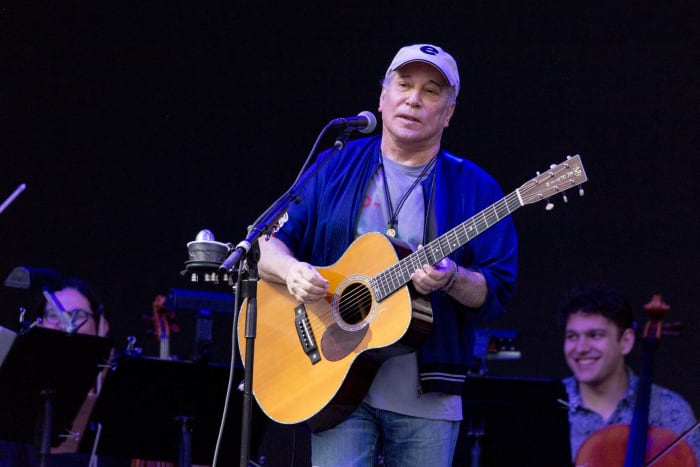
The breakup of Simon & Garfunkel shook the music world to its core, largely because the duo wasn't on any sort of artistic or commercial decline but instead was ascendant, as the final album, 1970's "Bridge over Troubled Water," ended up being the two's best-selling and most-loved record to date, even netting them the Grammy for Album of the Year. In truth, the boys had tension between them even during the recording of "Bridge," with Paul Simon allegedly writing "The Only Living Boy in New York" after he was in the booked NYC studio but Art Garfunkel couldn't make it back due to the filming of his part in Peter Nichols' "Catch-22". The group dissolved with both of the boys quitting each other (although Paul allegedly initiated it) and both went on to have solo careers. But that hasn't stopped them from intermittently reuniting from time to time for benefits or other worthy causes as they see fit.
Peter Gabriel (Genesis)
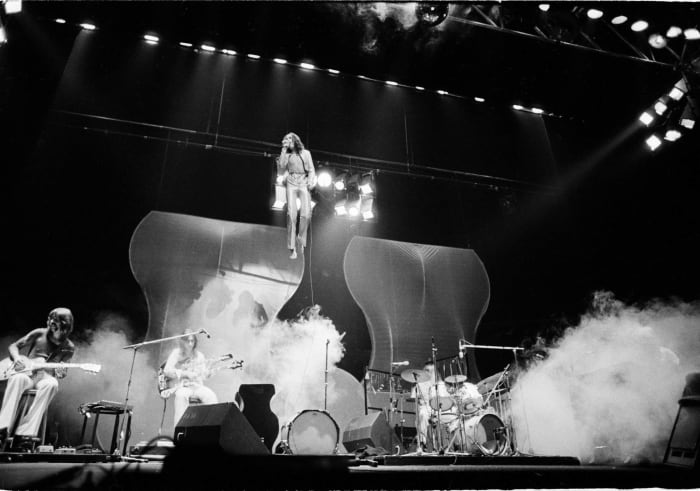
"There was all this big time stuff happening with long tours being planned way in the future, and I just felt I was getting to be part of a machine," Peter Gabriel said in the documentary "Genesis: A History." "I felt I was becoming a sort of stereotype, sort of 'rock star,' or falling into wanting that ego gratification. I didn't like myself, I didn't like the situation, and I didn't feel free." In truth, dealing with the birth of his first child while the British prog-rock legend worked on the band's 1974 opus, "The Lamb Lies Down on Broadway," meant that Gabriel was the album's lyrical architect but left a lot of music to the band, bringing in Brian Eno to help with certain synth parts even if the band felt uneasy about it. Performing its concept album in full during tours didn't help matters either, as it basically turned Genesis into The Peter Gabriel Show. So many fans and critics dismissed Genesis as being done after Gabriel announced he was leaving the group following the last "Lamb" performance — but unbeknownst to the world, a certain drummer had a certain idea of a direction the band could go in.
Zayn Malik (One Direction)
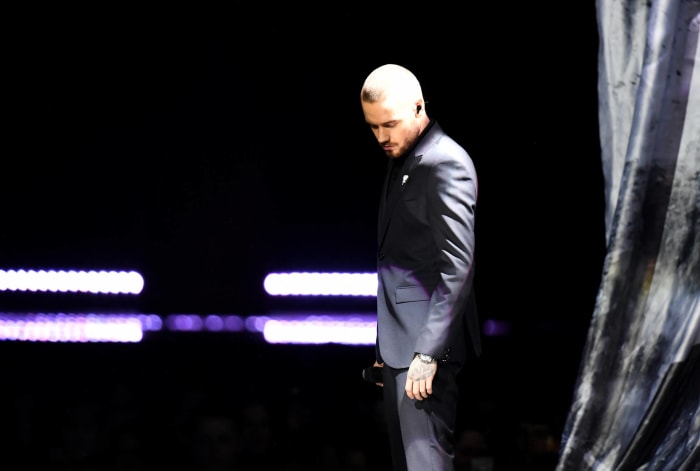
March 25, 2015: the day that Tumblr nearly broke. On that day, the U.K. boy band One Direction released a statement letting the world know that Zayn Malik, arguably the best vocalist in the ever-popular five-piece, was leaving right in the middle of its tour, breaking the hearts of adoring teens the world over. "My life with One Direction has been more than I could ever have imagined," he stated, "But after five years, I feel like it is now the right time for me to leave the band. I'd like to apologise to the fans if I've let anyone down, but I have to do what feels right in my heart. I am leaving because I want to be a normal 22-year-old who is able to relax and have some private time out of the spotlight." Of course, that time didn't last for long, as less than a year later, he dropped his lead solo single, "Pillowtalk," and ended up with a global chart-topper on his hands. The remaining boys put out one more album without him, but before long, every other member followed suit with solo projects of their own.
Justin Hawkins (The Darkness)

The Darkness came out of nowhere in 2003 with its debut album, "Permission to Land," and the ribald, throwback party-starter of a rock single "I Believe in a Thing Called Love." The song radiated a goofy charm but was anchored by vocalist Justin Hawkins' wild octave-shifting range. They band other hits in the U.K. and even put out a bloated sophomore effort in 2005, but in October of 2006, Hawkins released a statement he was leaving the group that brought him to fame over personal issues. "It will be an upheaval," Hawkins noted. "But it's time for me to move on. It would be damaging to my recovery to stay on. I'm not blaming the band for my problem — I am an addict." Hawkins would later form two other bands (The Stone Gods and Hot Legs) that failed to make any impact, leaving Hawkins to reunite with The Darkness in time to put out "Hot Cakes" in 2012 and a series of diminishing-returns full-lengths after the fact.
David Lee Roth (Van Halen)

When you're a band like Van Halen and you just put out a mega-hit of an album like "1984," propelled by such iconic singles as "Jump," "Panama" and "Hot for Teacher," it's kind of weird when the public doesn't hear from you for a while. Yet that's exactly what happened following the release of 1985's "Crazy from the Heat" EP, which had a solo David Lee Roth covering standards through his own distinct pop prism. A film of the same name starring David was in the works, but his increasing push of the band in a pop direction was at odds with Eddie Van Halen's hard-rock roots. And although no press statement was ever released, sparring interviews with both Eddie and David unveiled how deep the tensions ran, with Eddie once declaring "Twelve years of my life, putting up with his bullshit," implying that Roth left on his own accord even as Eddie wanted the band to continue, shortly thereafter announcing they were looking for a new vocalist. Yet time heals all wounds, and Roth rejoined the group for a tour in 2007, with the "classic" lineup even managing to get a new album together. And lo and behold, 2012's "A Different Kind of Truth" ended up being a bona fide hit.
Daniel Blumberg (Yuck)

Yuck may not have the same name brand familiarity as the other groups on this list, but when this English rock band's self-titled debut dropped in 2011, music critics tripped over themselves praising Yuck's conscious rekindling of the early '90s indie rock sound, their fuzzed-out guitars and bright melodies recalling greats like Pavement and Superchunk. Then, two years after that record appeared, the band put up a note on its Facebook page informing the world that its sophomore album was on the way but this time without frontman and co-songwriter Daniel Blumberg, who abruptly left because "he's decided to focus on other things." Unfortunately for Yuck, its two subsequent albums failed to garner the same level of notoriety as the debut, and even the band's official Twitter account ended up being used by the other founding member, Max Bloom, to promote his new solo efforts. The group formally disbanded in early 2021, and while no one knows what led to the band's members parting ways, but at least its legacy will always include one truly classic album.
Nick Jonas (The Jonas Brothers)

"I said, 'You know, I feel like the Jonas Brothers should be no more, and we should go on individual journeys.' And it didn't go so well," recounted Nick Jonas to Rolling Stone, talking about why the Disney Channel-approved family of poppers decided to take a hiatus in 2011 following their breakout success. A lot of the tension came from the group consistently being boxed in as nothing more than family-friendly rockers, conflicting with each of the brothers wanting to express themselves outside of the House of Mouse. The year prior, Nick Jonas made the first move, unleashing his band Nick Jonas & The Administration onto the world, while Joe tried to be a sexy pop loverman. Incidentally, Nick's subsequent solo efforts actually succeeded in making thirst-trap dance-pop work for him, which in turn led Joe to go let his freak flag fly in the band DNCE, all while Kevin got two seasons of a reality show on E!. While Nick may have technically "quit" first, this story still has a happy ending, as the brothers eventually reconciled their differences and released a comeback effort that put them back on the musical map, even netting them their first-ever chart-topping single in the process.
Janet Weiss (Sleater-Kinney)

Sleater-Kinney is and will always be one of the greatest riot grrrl acts to ever exist, with Carrie Brownstein, Corin Tucker and Janet Weiss crafting explosive, punky songs full of life, rage, sadness and sometimes utter joy. The group went on a hiatus in 2007 but came back in 2015 with the excellent straightforward stunner "No Cities to Love." Yet in wanting to mix things up for 2019's "The Center Won't Hold," the band brought in indie-pop polymath St. Vincent to help produce, and Weiss, the band's drummer and credited co-writer was reduced to mere drummer status with little to no say in the new material. "I said, 'Am I just the drummer now?'" Weiss recounted during a podcast, "They said yes. And I said, 'Can you tell me if I am still a creative equal in the band?' And they said no. So I left." Weiss announced her departure a month prior to that contentious album being released and immediately split the indie rock press into camps over which party came off better in this spat.
Lou Reed (The Velvet Underground)

In late 1970, The Velvet Underground released "Loaded" onto the world, titled such because, after years of Andy Warhol-backed adventures into the very limits of what rock songs were capable of, frontman Lou Reed was asked to maybe give the label a hit song or two. Thus, Reed responded with a record that was "loaded" with hits. Despite poppy and truly legendary numbers like "Who Loves the Sun," "Sweet Jane" and perpetual soundtrack-sync "Oh! Sweet Nuthin'," the album once again failed to generate any hits. But that was largely due to the fact that just a few months prior, a fallout with the band's manager resulted in Reed quitting the group by way of not showing up to its scheduled live gigs. New member and occasional vocalist Doug Yule took over and even made another Velvets album without Reed's involvement: 1972's oft-forgotten "Squeeze." It's a pleasing enough pop record, but by not having any of the founding Velvets involved in its creation, it's a record that is largely dismissed and frequently not counted in the group's "official" discography.
Graham Coxon (Blur)

While Blur will always be known as those "Song 2" fellas to those in the U.S., the Damon Albarn-fronted band has a rich legacy in the U.K. that resulted in a giant rivalry with Oasis, a litany of classic singles and full-lengths and soon saw Albarn spinning off his time with Blur into a series of other ventures, most famously with his hip-hop/alt-pop animated collective Gorillaz. Guitarist and co-songwriter Graham Coxon, meanwhile, released a litany of solo records under his belt throughout his tenure with Blur, so professional jealousy wasn't the band's issue. Instead, Albarn and Coxon's friendship had run its course — right in the middle of recording their seventh full-length, 2003's "Think Tank." There are differing stories as to why Coxon didn't want to be a part of the group he founded anymore, but it all boiled down to creative differences, what with Albarn hiring dance producer Fatboy Slim to helm some tracks and the ever-rock-minded Coxon wanting to continue the experiments of their last record. Fans were shocked when Coxon announced his departure, and Albarn admitted that in trying to replace Coxon, they had to hire multiple guitarists to fill his role — but it just wasn't the same. Yet one reunited Olympics closing ceremony show later, the group was back at it and even managed to churn out a new album: 2015's ho-hum "The Magic Whip."
Camila Cabello (Fifth Harmony)

While Fifth Harmony's success following their appearance on the U.S. version of "The X Factor" was somewhat surprising, even more shocking was Camila Cabello's sudden exit from the band in late December 2016, so shortly after the music video for its cheeky hit "Work From Home" hit over a billion views on YouTube. A spat emerged between Cabello and the other members through social media posts and press releases (the group hit first, informing the world via Twitter that it was told of Cabello's leaving through her representatives only), but it was Cabello who was landing hit songs with Shawn Mendes and Machine Gun Kelly all on her own, becoming such an in-demand duet partner that by the time she launched her solo song "Havana" she immediately topped the charts, which was something Fifth Harmony never managed to do on its own. The band tried to move on in Cabello's absence, but its final album didn't have any of the heat of its other records. At least Normani is finding solo success now, and if the rest of the members are able to carve out their own solo niches, who knows: maybe a reunion not long after?
Sting (The Police)

For fans of The Police, no member fully "quit" the band, because instead of something so dramatic, the group just went into a hiatus in 1984 after finishing the tour for "Synchronicity," the gigantic smash album that earned the band Grammy Awards, chart-topping singles and all the success it ever could've asked for. Yet depending on how much backstage gossip you want to believe, the band's "hiatus" was largely due to Sting wanting to go solo, as this once-democratic outfit was increasingly turning into The Sting Show, starring Sting and all of the hits that he wrote for the group. This allegedly led to Sting blowing up at his bandmates, rejecting their songs and even recording their parts for "Synchronicity" in different rooms. Thus, it was no surprise that Sting supposedly "left" the band first. Shortly after the hiatus was announced, all three members went on to tackle their own muses, with Sting's solo success coming quickly and swiftly with radio hits that ended up spanning decades. Yet all's well that ends well: The group members managed to set aside their differences and reunite for a highly successful 2007-2008 comeback tour.
Ice Cube (N.W.A.)
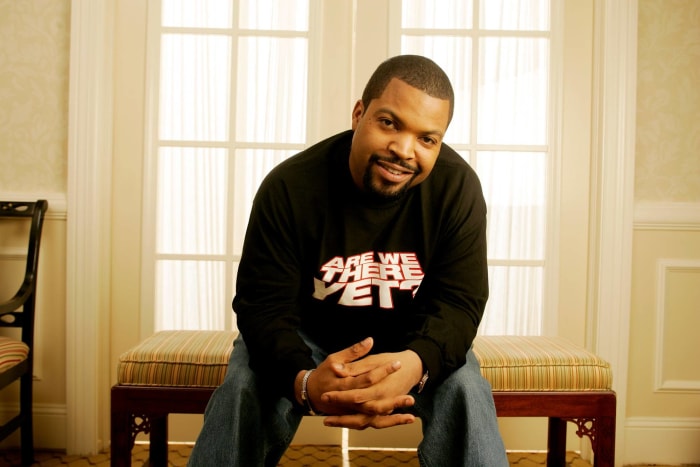
According to Ice Cube himself, the way that his departure from seminal gangster-rap collective N.W.A. was portrayed in the hit 2015 biopic "Straight Outta Compton" was actually pretty accurate. As Eazy-E and band manager Jerry Heller — who both so happened to start the record label that N.W.A.'s music came out on — spent all of their earnings on cars and riches, Cube couldn't help but wonder why he was still living with his parents. A dispute over royalties emerged, and Cube ended up negotiating a record deal with rival Priority Records in secret. The gambit worked, and with his first several solo full-lengths kept going platinum, Cube keeping the rivalry going by releasing some of his well-articulated diss tracks as singles, thereby keeping his name in the press as his former bandmates struggled to come up with a worthy response.
Lionel Richie (The Commodores)

Although The Commodores initially burst onto the scene with lively instrumentals in a variety of formats, the truth of the matter was that as the beloved Alabama funk-soul ensemble grew in popularity, so did frontman Lionel Richie's interest in writing ballads, and almost all of them (including classics like "Three Times a Lady" and "Easy") became instant classics. To hear Richie tell it, he read all of the press notices, which seemed to either pity the band for not playing hot-fingered funk like it used to or praised Richie for being a mature pop songsmith. This led to heated rehearsals and pointed band meetings, causing Richie to leave and go solo in 1982. While the Commodores still managed to get hits on their own (especially with 1985's "Nightshift"), Richie went positively supernova, racking up classics like "All Night Long (All Night)," "Hello" and "Say You, Say Me," while his 1983 megasmash full-length "Can't Slow Down" won the Grammy for Album of the Year over Bruce Springsteen's "Born in the U.S.A." and Prince's "Purple Rain." That's what we call a power move.
Noel Gallagher (Oasis)

It all ended with a plum. While brothers Liam and Noel Gallagher constantly bickered during their time in their legendary Britpop group, Oasis, many figured that tension translated into how bloody good their songs were. While the two would do things to irritate the other like bail on an acoustic gig only to go into the audience and ridicule his still-performing brother, a 2009 fight backstage resulted in Liam throwing a plum at dear brother Noel, and the end result was the group canceling its concert and Noel releasing a statement on the band's MySpace page no less: "It's with some sadness and great relief to tell you that I quit Oasis tonight. People will write and say what they like, but I simply could not go on working with Liam a day longer." True to their word, despite the occasional whispers, the two haven't buried the hatchet, and each has gone on to form new bands with varying degrees of success.
John Frusciante (Red Hot Chili Peppers)

When someone is telling you about that time when god-level guitarist John Frusciante quit Red Hot Chili Peppers, a common response is "which time?" While Frusciante didn't join the funk-rock pioneers until five years into their run, it was during his tenure that the band matured out of its whiteboy party posturing and started writing real, tangible songs. He was there when the group's 1991 breakthrough record, "Blood Sugar Sex Magik," was released, but the sudden rush of fame from that album's success led to drug addictions that made him suddenly quit in 1992, after which the band hired Jane's Addiction guitarist Dave Navarro to fill his shoes. A newly-sober Frusciante rejoined the group in 1998 and helped in crafting "Californication," its biggest album to date. He stayed around for a few more albums (all giant hits, naturally), but left the band again in 2009, explaining he was on good terms and just wanted to focus on his solo music. As of this writing, he's back in the fold, thereby kicking out fill-in guitarist Josh Klinghoffer. The reunited rockers dropped new album "Unlimited Love" in 2022, and at this rate, we can't wait to hear what new music they put out before Frusciante leaves again.
Robbie Williams (Take That)

In the early '90s, there was hardly a bigger boy band in the U.K. than Take That: a scrumptious five-piece that featured a charismatic quintet that happened to contain a dynamite pop songwriter in the form of Gary Barlow. Although the band released only three albums in the course of its first run, the hard-partying lifestyle of Robbie Williams proved too much for the group, and to hear him tell it, a band ultimatum telling him to sober up or get out was all he needed to leave the outfit, to say nothing of his jealousy over Barlow's own success. As it turns out, Williams' solo career made him into one of the best-selling pop stars in U.K. history. Yet in the mid-2000s, Take That reformed as a quartet and ended up serving up smashes that proved even bigger successes than during its heyday, all of this culminating in 2010's "Progress," a rare record where Williams rejoined the lineup and the group was a quintet yet again. The reunion didn't last long, however, as both Williams and Jason Orange departed prior to the group's follow-up album, which was appropriately titled "III."
Christopher Owens (Girls)

When Girls debuted in the late-2000s, their backstory was complete music critic bait, as while the duo of Chet "JR" White and Christopher Owens had a great affinity for '60s and '70s rock amalgams, Owens was raised in a cult until the age of 16, after which he busked and absorbed all sorts of disparate pop culture influences despite not having any true introduction to them during his youth. That helped fill in the details of the band's raw and reverent rock sound, unleashing two albums onto the world that were held in high critical esteem. Yet following the release of the 2011 sophomore effort, "Father, Son, Holy Ghost," Owens felt bad seeing so many other touring musicians come and go during their tenure, and took to his Twitter account in July 2012 to tell the world "I am leaving Girls. My reasons at this time are personal. I need to do this in order to progress. I will continue to write [and] record music. More will be announced soon. I thank you all for everything." White didn't feel any need to continue the group, and Owens would later release a solo record. But for a band that burned so brightly so quickly, it was a surprise to many to see it disappear just as suddenly.
Brian "Head" Welch (KoRn)

Nu-metal kingpins KoRn often wrapped their nihilistic musings in hard rock songs that still retained a surprisingly catchy edge, and it's of no surprise that by the time they got around to releasing 1998's "Follow the Leader," they were on top of the world. Yet in 2005, rather abruptly, the band released a statement indicating that "KoRn has parted ways with guitarist Brian "Head" Welch, who has chosen Jesus Christ as his savior, and will be dedicating his musical pursuits to that end." Welch would later release a book in 2008 detailing his journey, which was called "Save Me from Myself: How I Found God, Quit KoRn, Kicked Drugs, and Lived to Tell My Story." Then, in 2012, he rejoined the group. What happened? For these answers, maybe you should look no further than the title of his 2015 book: "With My Eyes Wide Open: Miracles and Mistakes on My Way Back to KoRn."
Steve Perry (Journey)

While Journey's journey features a fair share of lineup changes, the San Francisco band's evolution from prog-rockers to stadium-fillers largely can be pinned on the introduction of vocalist Steve Perry in 1977. It was during his initial 10-year stint that the band found its greatest commercial success, obtaining immortality with hits like "Wheel in the Sky," "Who's Crying Now," "Open Arms" and (of course) "Don't Stop Believin'." Yet as the group toiled away on 1986's "Raised on Radio," Perry's attention was split between producing the record and attending to his dying mother. Following the tour promoting the album, he was done with the group. "The reason I left is because I was just truly burned out," Perry once noted. "My love for music was getting really, really questionable within my heart, and I kind of had to stop. There was no easy way to stop, leaving the mothership that I had so loved and worked so hard with the guys to build. It was tough." The group had another album in the form of 1996's "Trial by Fire," but after a spell, the band looked into getting a new vocalist, which in turn led to some friction between Perry and his former bandmates that still hasn't fully resolved to this day.
Geri Halliwell (Spice Girls)

In retrospect, the Spice Girls' reign lasted only for a few scant years, but during that time, they inhaled so much pop star oxygen that it was hard for any other act to breathe during their reign. Moving tens of millions of units worldwide and scoring an almost-unending number of U.K. chart-toppers, Geri Halliwell (a.k.a. Ginger Spice) abruptly left the group in the middle of the tour promoting the album "Spiceworld." "This is a message to the fans," she started in a statement released by her lawyer . "Sadly I would like to confirm I have left the Spice Girls, this is because of differences between us. I am sure that the group will continue to be successful, and I wish them all the best. I have no immediate plans and I wish to apologise to all the fans and to thank them and everyone who's been there." The world was stunned, and a less-successful album of the girls pared down to a quartet followed, their hiatus coming shortly thereafter. Thankfully for pop fans the world over, the group reunited for a few tours — some with Victoria Beckham, some without — but so far has yet to put out any new music of note.
Bob Welch (Fleetwood Mac)

The long, convoluted history of Fleetwood Mac involves many members coming and going: some on their own volition, but more often than not they're just fired by founder Mick Fleetwood. Bob Welch was a guitarist and songwriter who was much loved by the public but frequently ran into difficulties with then-figurehead Danny Kirwan, and a blowout argument between the two eventually resulted in Fleetwood sacking Kirwan. The years following were tumultuous, but Welch still brought in some classic songs of his own to the Fleetwood fold like "Sentimental Lady" and "Hypnotized." Yet in December of 1974, a mix of creative exhaustion and problems at home led Welch to leave the group on his own, soon to be replaced by the dynamic duo of Lindsey Buckingham and Stevie Nicks who fundamentally changed the direction of the band forever. Welch still managed to carve out a small solo career for himself where various Mac members stopped in to contribute parts to his songs -- even scoring some hits with a revamped "Sentimental Lady" and his own "Ebony Eyes" — and kept at music for as long as he could up until his tragic passing in 2012.
Ryan Ross (Panic! At the Disco)

While these days Panic! At the Disco is basically a vehicle for charming frontman and vocalist Brandon Urie, Panic! initially started as a band wherein guitarist Ryan Ross was responsible for all of the lyrics. Their emo-rock debut album made them instant stars, but their sophomore record, 2008's "Pretty. Odd.," completely flipped the script by giving their fans full-on Beatles cosplay. That record had a more democratic songwriting process, but it paled commercially to its predecessor. An announcement on the band's website the following year stated that both Ross and bassist Jon Walker were leaving the group to "embark on a musical excursion of their own." The party line for the split was creative differences, as Ross and Walker went on to form the throwback rock outfit The Young Veins, while Urie took over as Panic!'s chief primary force, and the band became nothing short of a modern pop hitmaking machine.
Evan Sawdey is the Interviews Editor at PopMatters and is the host of The Chartographers, a music-ranking podcast for pop music nerds. He lives in Chicago with his wonderful husband and can be found on Twitter at @SawdEye.
More must-reads:
Trending in Entertainment
Customize Your Newsletter
 +
+
Get the latest news and rumors, customized to your favorite sports and teams. Emailed daily. Always free!
Use of this website (including any and all parts and
components) constitutes your acceptance of these
Terms of Service and Privacy Policy.

